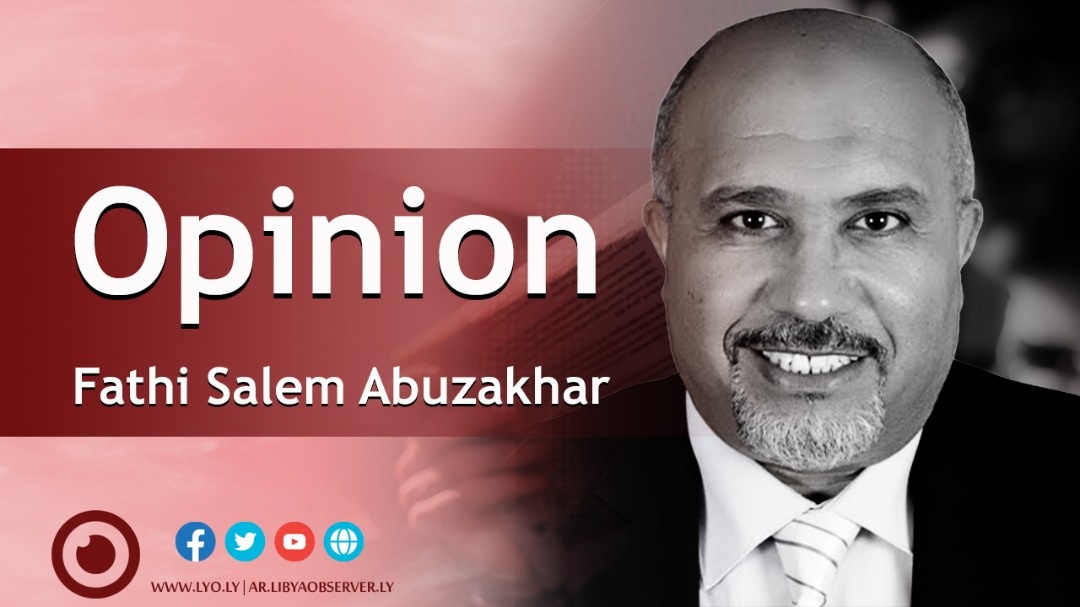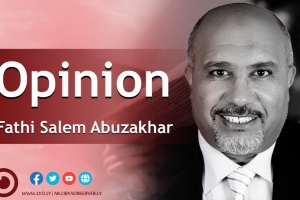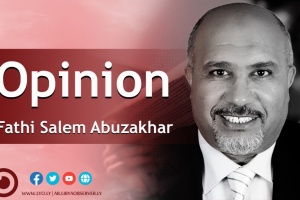By Fathi Salem Abuzakhar, a Libyan writer
What is going on in Libya? Role of international consensus!

It is true that politics is not governed by any principle, as much as by interests. What has recently happened in Libya is a cause for slipping into a cycle of skepticism and even accusations of treason.
The writer of this opinion decided not to rush, before reading and contemplating the course of events on the complex Libyan stage, in which the leaders of the scene in Libya contribute and play secondary roles, as international rivals play the key ones. One could not miss the fact, that the ambiguity that hinders the Libyan scenes has its causes, and what makes the picture blurrier is the fact that what is happening on the Libyan stage is controlled behind the scene by international actors.
Causes of the blurry picture:
As said, the political dynamics on the Libyan stage is not subject to the professional rules of politics which basis is sovereignty of the decision. In this respect, it is difficult to believe any Libyan official, regarding the interests of the international system, which has no concern for Libyan people as much as its concern for Libya’s geopolitics, as well as its natural resources especially oil and gas, which prices have soared due to the war in the Ukraine and Russian pressure. The question here; who has removed Mustafa Sanallah?
Decisions of oil, and war and the international system:
It is to be noted that the crisis in Libya is man-made, maintaining the expired legislative bodies and contributing to the making of the crisis are tangible evidence. Although, the two elected bodies did not live up to their responsibility towards the Libyan people and focused their attention more on their personal interests, extending them to the maximum extent possible, their use and preservation by the international community is clearly visible.
War and the international system:
Although the direct cause of the 2011 war was the arrogance of the dictator Muammar Gaddafi, the international system played important roles in fueling it, siding initially with the unarmed free February people. However, after setting foot on the Libyan soil, it drawn up war plans, sometimes igniting wars and at other times extinguishing them, besides the disinformation media that played its directive role, exploiting the passion of the people, aspiring for freedom, and uprising against dictatorship.
Indeed, the international community took over planning command and left implementation tools to be managed remotely or rather indirectly with the invocation, exploitation and employment of Libyan diversity, ethnically, linguistically and sectarian wise, especially religious trends, including the exotic Salafist Madkhali funded by Saudi Arabia, and worse than that, an unjust division of the Libyan people to: revolutionaries and stooges , free and slaves, which increased the chasm and helped ignite wars and skirmishes from time to time.
The last war on April 4, 2019, was flared up when the interests of the international system were rather complicated and overlapped and the post-utilitarianism of the United States flourished to the point of compatibility with its enemy Russia, in order to stop Chinese expansion in Africa, and their consent to support the invasion of the Daeshi Haftar to Tripoli. However, when the Free Libyans stood firm and stopped the attack of the war criminal and his mercenaries, supported by 7 countries: Egypt, the UAE, Saudi Arabia, Jordan, France, Russia and America, America’s tactics changed, especially after the Russians went too far and expanded in Libya and Mali. So, the USA opened the way for the Turkish maestro, who found its interest in the maritime agreement, eyed before 2011, and served its security by the military agreement, and when Haftar’s mercenaries retreated back to Sirte, a red line was drawn by the Security Council members participating in the war and not by Mr. Sissi, as he claimed.
Today, despite the fact that the free Libyan people refuse to accept any complacency with the participants in the invasion of the capital, they are yet to find hearing ears for their demands, as the decision of war is with the UN Security Council member states, that produce weapons and military equipment.
The decision to welcome Abd al-Razzaq al-Nadori, by Mr. Mohamed al-Haddad was not welcomed by the free people of Libya, but if we revert back to our argument at the outset of the article, the decision here is not a sovereign one, or else how can be two people for the one position of chief of staff?! Adapting to or rejecting such state, cannot be expressed in a way that satisfies everyone. In this regard, it is difficult for the writer to identify a clear position, and perhaps, as we say in the Libyan dialect: "You blame and excuse."
Oil and the international system:
Although, the Organization of Petroleum Exporting Countries, founded in 1960 from 5 countries whose peoples do not speak English, yet it has adopted it as its official language. OPEC is working on regulating production quotas for oil-exporting countries, and the number has since increased to 13 countries, and then after OPEC Plus, the number reached 23 countries, including Russia, after it has been decided to reduce production.
It is true that OPEC established its rules for accession and production quotas, but there are countries that control oil policies, driven by their interests, even if it requires to employ oil in the global conflict.
Without going into the sovereignty of the decision, to dismiss Mr. Mustafa Sanalla from his position, and appoint Mr. Farhat bin Qadara instead as head of the National Oil Corporation, it is to be said that the international consensus is the master of the situation and not as Mr. Dhebeiba tried to explain to us, who certainly discussed the issue, but the understandings are governed and organized by international meetings. Biden’s visit to the Middle East is only to see beforehand implementation of the plans drawn up in official and secret meetings, with the help of countries, including those who seek US appeasement, such as the Gulf states, which need to secure their regimes, and Egypt, which needs wheat and loans, and others that serve their own interests, such as Israel, driven by Christian-Zionist doctrine, or its collaborators, such as Britain and Turkey, and those who have common and crosscutting interests such as Germany, Iran, Italy, and we should not forget those who have a hostile rivalry, as is the case with France and Russia.
It is difficult to decipher the overlapping and intertwined interests, and without forgetting China, the Silk Road and its inroads into Africa, and here we find that Libya is acted upon and can only play the role of acceptance in accommodating the interests of all. This task is yet difficult and complicated, the Libyans of both gendre standing idly by can easily indulge in rhetoric and directing blames, so all be they intellectuals or politicians, biased to one side or the other, are judgmental.
The absence of clear picture of what is happening behind the political scenes, makes the poor Libyans ready to play reactive roles on the Libyan theater by closing oil, on the orders of Russia through Haftar, or running an armed convoy through an anonymous, taking advantage of the enmities inherited from the remnants of hatred for the former regime to sustain the crisis “Pacifier”, spread terror, undermine security, or to use lack of services as pretexts: fuel, electricity, cash etc.
Final word:
We stress that today we may blame and yet excuse Mr. Dhebeiba for what is happening in the Oil Corporation. We also know that he retains the defense portfolio, but the war decision is with those involved in the 2019 war.
The actors in Libya must support the path of peace, without sacrificing the civilian and democratic nature of the state, thereby consolidating the principle of rights and citizenship. God Be with Libya.
Disclaimer: The views and opinions expressed in this article are those of the writer, and do not necessarily reflect those of the Libya Observer



